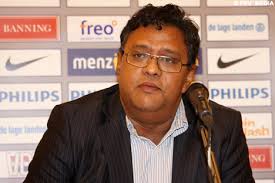By Samindra Kunti
April 24 – All India Football Federation (AIFF) general secretary Kushal Das has accused I-League clubs of bringing disrepute to the governing body after they boycotted the federation’s Super Cup last month.
In March, seven I-league clubs refused to participate in the Super Cup in Bhubaneswar, instead demanding a meeting with AIFF president Praful Patel to decide the future roadmap of Indian football. Patel assured the clubs he’d grant them a meeting in April, but that was not enough to appease them and they pulled out of the competition.
The AIFF has long claimed they will offer a solution to India’s bi-league system, where the I-League runs concurrent with the Indian Super League, modelled after cricket’s IPL and backed by Reliance, but so far the federation has been able to do very little to resolve the schism in the Indian game.
“At times, there are clubs, who, on a regular basis, bring the federation to disrepute by saying all kinds of things,” said Das in an interview to IANS, referring to Minerva Punjab and their owner Ranjit Bajaj.
“That is something not acceptable. No federation in the world would tolerate this kind of thing. The clubs are always free to give their opinion, but cannot malign the parent body. Statements like the AIFF is a sold out body and partial is absolutely not acceptable and strictest measures have to be taken.”
Bajaj accused the federation of working against the clubs and those words have not been received well at Dwarka House, where the I-League has long been patronised. The dispute between the AIFF and the respective I-League clubs has been referred to the disciplinary committee, which will meet later this month in the Indian capital New Delhi.
Das offered strong words for what the AIFF deems rebels against the system. “”Instead of coming together to discuss the matter with the federation and our marketing partners, they (the clubs) have almost tried to rebel against the federation,” said the Indian football official. “That won’t help. They wanted to meet the president and the president always said he would meet them. In fact, he was busy and was traveling. He sent a communication in this effect. He said he would meet them between April 10 and 15. Now he is upset that the clubs still rebelled against the whole thing and did not play the Super Cup. Not playing football is not a solution. That’s absurd.”
“By creating negativity, they are shooting themselves in the foot. Indian football has a long way to go and all stakeholders will have to work together to take it forward. Clubs have to be patient.”
Those words will come across as gratuitous to long-time followers and insiders of the Indian game. The AIFF has suggested a model that would install the ISL as the country’s top league with the I-League as the next tier, but when and how it would implement those plans has been a longstanding mystery that has held back the development and marketability of the Indian game for too long.
“There has to be a top league, followed by the next tier,” explained Das. “There is no truth in some I-League clubs saying that they are being ‘killed’. While all the national team players are playing in ISL, I-League clubs are also developing players, the emergence of Jobby Justin and (Michael) Soosairai are prime examples. They have now moved to ISL. The clubs have the scope to earn revenue by developing these players. In four-five years’ time, there could be relegation/promotion once the contractual obligations (in ISL) are over.”
Contact the writer of this story, Samindra Kunti, at moc.l1751593504labto1751593504ofdlr1751593504owedi1751593504sni@o1751593504fni1751593504


